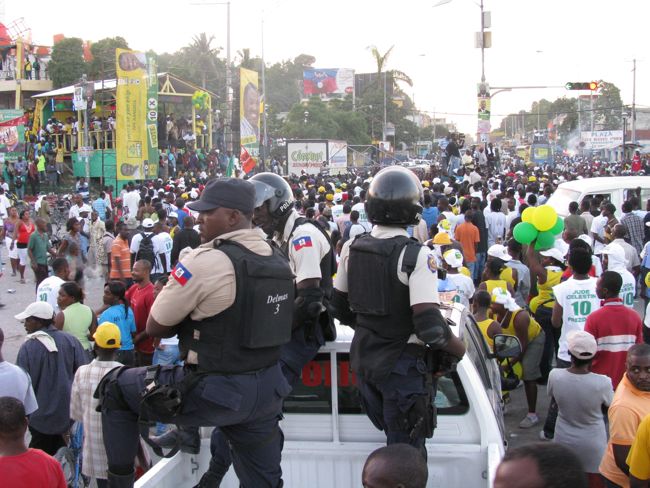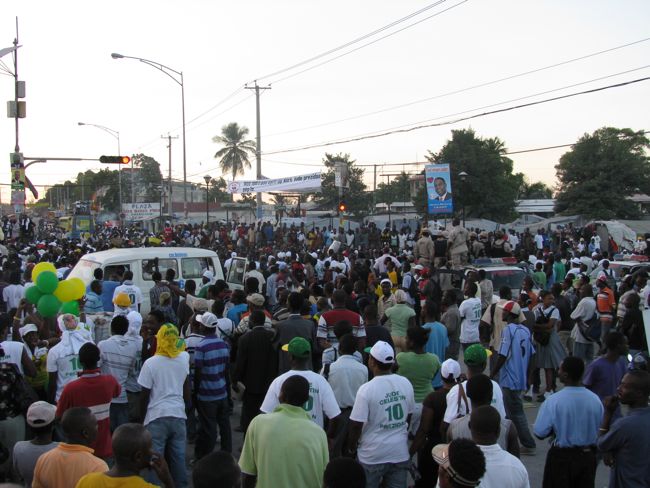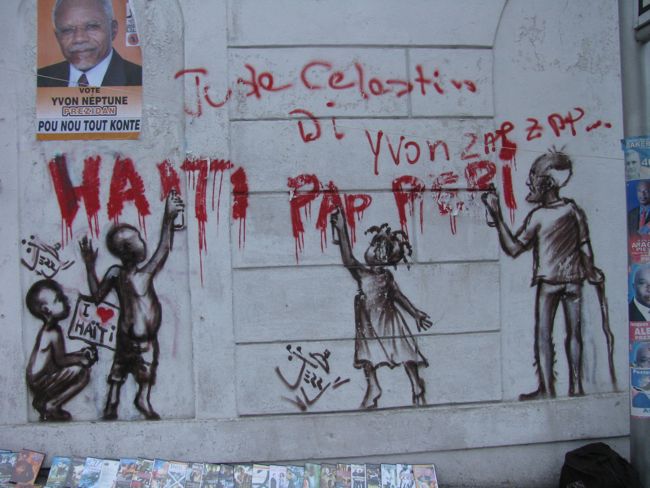Lorin Mallorie in Haiti: Widespread fear, anger over election results
As an American, I’ve experienced heated emotions during election time.But, I have never experienced fear. Certainly not fear.
This week, however, Port-au-Prince did — as I have never seen. All the gas stations closed at 8 p.m. the night before Election Day, and a citywide vehicle ban remained in effect until the day after, Monday morning.
All for fear of tire- and building-burning, drive-by shootings, ballot tampering and general electoral corruption.
All of which happened, nonetheless, and I found myself once again fleeing Petionville, just ahead of angry protestors.
Protests broke out just hours into voting, with accusations of ballot tampering by the current government and their favored candidate, Jude Celestine and his party.
Deceased earthquake victims remained on registration lists, and voters who had lost their voter cards in the quake were not permitted to vote, despite being listed.
Twelve of the 18 presidential candidates renounced the elections as corrupt, requesting their annulment (Jude Celestine was not one of them), and accused the current government of tampering with the vote to favor Celestine.
Fifty-six polling stations reported corruption. The BBC reported that Mark Weisbrot — co-director of the Center for Economic Policy and Research, which sent observers to Haiti’s election — called it “a farce.”
In Haiti, of this there is no doubt.
Despite all this, Haiti’s electoral council and current government have held that Sunday’s votes will stand. However, a run-off election will be held between the top two presidential candidates if no one candidate receives more than 50 percent of the vote.
As we await the results, the country is “hot.” If Celestine is proclaimed victor, it will surely explode.People are afraid. Genuinely afraid – of each other.
The short democratic history of Haiti is marred with violence, fraud, government overthrows and often-unwelcome international intervention. This year, just having elections so quickly after the earthquake caused uproar from those living under tarps, the jobless and the sick — who are in no condition to follow politics.
People are afraid because “the mass” is angry.
All month, it’s seemed, “the mass” — the boiling underbelly of the social structure — has threatened to rise at any moment, likely creating a schism by the majority of the country’s poorest.
The days wear on, the “etrangers” (foreigners) remain, and nothing changes. The cholera creeps in – no work, no home, no hope. For most, nothing changes.
It’s humiliating, dehumanizing and quite honestly, sickening to witness.
“The mass.” There is no other name for it when the people of Haiti come together: One great, breathing body of struggle, resistance and strength.
At an election rally Thursday for Jude Celestine, “the mass” came to bear witness. The previous weeks were marked with cholera protests and election shootings, yet Carrefour Airport road was absolutely alive with the crowd.
“Are you American?” said the guy next to me in English, as I filmed from atop a cement barricade.
“Yes.”
“Aren’t you scared?”
Every few minutes someone would start running, a break in the crowd and tens of others would follow. There was an edge of fear and excitement, like at any moment a shot could sound and panic would envelop the streets.
But as the live music came to a close and Celestine finally spoke, his support seemed lacking. People left, or just watched without response — far less than half the crowd seemed to rally at his words.
It’s inconceivable that the people of Haiti will accept Jude Celestine as democratically elected. But whoever it is, the next president will need a lot more than the most votes to run this broken nation.As we wait for news of the victor, perhaps more than ever in this moment in Haiti, only tomorrow knows what it will bring.
###
____________________________________________________

Cuba's solidarity with Haiti
By Rickey Singh
CUBA'S latest inspiring example of commitment to the suffering masses in Haiti is the rushing, this past weekend, of an additional 300 doctors, nurses and health technicians to that earthquake wrecked and cholera-plagued poverty-stricken nation of our Caribbean Community (Caricom).
This demonstration of practical solidarity, characteristic of the government and people of Cuba in responding to human tragedies across continents, has resulted from an international appeal by Valerie Amos, United Nations Under-Secretary General for Humanitarian Affairs.
As Haitians continued burying their dead from the cholera epidemic — estimated at some 2,000 — and while others are caught up in political conflicts over allegations of electoral fraud at last Sunday's presidential and parliamentary elections, the desperate need for doctors and medical personnel continues to rive the UN appeal and the humanitarian response such as Cuba's.
Disclosure of the latest batch of Cuban doctors, nurses and technicians came in a statement released in Havana at the weekend, focused on "Reflections on Haiti—Underdevelopment and Genocide'' by Fidel Castro.
The legendary former president of that Caribbean nation that continues to survive the horrendous social and economic consequences of a 48-year-old economic blockade by the United States of America, said that his country's additional 300 medical personnel would now add up to more than 1,200 doctors, nurses and health workers in Haiti.
Some of the Cuban medical teams were working in Haitian communities long before last January's horrific earthquake disaster and the spread of the cholera epidemic from October.
The Cuban leader noted how discouraging it was to learn last week from UN Under-Secretary General Amos that "so far less than ten per cent'' of an estimated emergency need of US$I64 million had been realised.
Castro subsequently noted that as of November 27 (eve of last Sunday's controversial elections), "there had not been a single cholera death in seven days within the 37 treatment centres being run by the Cuban Medical Mission in Haiti...''
There could be no confirmation from the Caricom secretariat yesterday on the current number of doctors and health workers mobilised for services in Haiti since the outbreak of cholera.
In the unfolding tragedies of Haiti, the earthquake of January destroyed the water and sewer network wherever they had existed, and where millions live in tents and often lacking latrines and "everything gets mixed up together....''
In embracing the plea of the UN officials for quick and meaningful responses with emergency assistance of medical personnel and resources, the former leader of Cuba for some half a century, said only ten per cent of affected Haitians living outside of the capital, Port-au-Prince, had received supplies of clean water and soap.
In reporting on the work of the Cuban Medical Brigade in Haiti, now reinforced with last weekend's contingent of some 300 doctors and nurses and health workers of the Henry Reeves Brigade, Castro explained:
"Almost 40 per cent of the sick have been looked after by members of the Cuban Medical Brigade which has 965 doctors, nurses and technicians who have managed to reduce the number of dead (from cholera) to less than one for 100....''
In a general appeal Castro stressed that it was "of vital importance that we avoid the epidemic extending to other countries in Latin America and the Caribbean because in today's circumstances. This would cause extraordinary harm to the nations in this hemisphere....
"We urgently need to seek efficient and rapid solutions in the fight against that epidemic...''
>via: http://www.trinidadexpress.com/commentaries/Cuba_s_solidarity_with_Haiti-1110...
_____________________________________________
Cholera in Haiti: How You Can Help
November 24, 2010 by Frank
A lot of people have been asking how they can help those who have gotten cholera here in Haiti. After being to a handful of Cholera Treatment Centers (CTCs) and talking to a bunch of people, it’s those organizations that are directly dealing with cholera patients that need to the most help right now. Here’s a break-down:
Doctors Without Borders has been managing the majority of the CTCs in Haiti since the epidemic began, and recently wrote a scathing message about how the other NGOs in the country need to step up their efforts (you can read that here). According the UN Health Cluster, which (attempts to) coordinate the distribution of aid in regards to health care, MSF is managing nine out of the 19 CTCs in the country, including the ones that are located in the worst parts of PAP. They are definitely someone who could use your hard-earned money, and they would put it to good use (you can donate here). Also, if you are a doctor or nurse and you speakfluent French or Kreyol, they are in desperate need for your help and you can volunteer with them for a period of no less than a month (for more info on that clickhere).
Elsewhere, the German Red Cross is running a CTC is Arcahaie, just an hour north of the city, and is doing a really great job trying to keep up with the overflow of patients that are constantly flooding in. In addition, they have taken their work a step farther and have started “mobile clinics” that drive through the surrounding areas and inform people about the symptoms of cholera, and what to do if they get it. Often times people just don’t have transportation to the hospital, so these mobile clinics are also working as makeshift ambulances if they come across someone who needs to get to a CTC ASAP. The website is in German, but inputting your credit card info is an international language. You can do that here.
Other Orgs that are managing CTCs are International Medical Corp (donate here),Partners in Health (Paul Farmer’s org, donate here), and Gheskio (donate on their homepage in the link to the left). All these organizations are doing great work, and not only are helping with the cholera outbreak, but they train Haitians to become medical professionals and work on hygiene promotion to stop the spread of disease in the future.
Almost every organization in Haiti is doing their best to step up and help with the cholera epidemic, and while they all need the help too (I’m sure), I truly think that if you want to directly help the people on the front lines of this epidemic, it’s those organizations listed above. These are trusted organizations with a history of working in this country, and if you are looking to make an impact then donating to them is the way to go.





